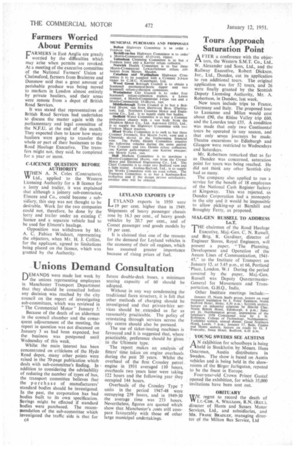Farmers Worried About Permits
Page 42

If you've noticed an error in this article please click here to report it so we can fix it.
FARMERS in East Anglia are greatly I worried by the difficulties which may arise when permits are revoked. At a meeting of the executive committee of the National Farmers' Union at Chelmsford, farmers from Braintree and Dunmow said that a great amount of perishable produce was being moved to markets in London almost entirely by private hauliers, and their areas were remote from a depot of British Road Services.
It was stated that representatives of British Road Services had undertaken to discuss the matter again with the parliamentary and legal committee of the N.F.U. at the end of this month. They expected then to know how many hauliers were going to transfer the whole or part of their businesses to the Road Haulage Executive. The transfers might not, they said, be completed for a year or more.
C-LICENCE QUESTION BEFORE AUTHORITY
WHEN A. N. Coles (Contractors), re Ltd., applied to the Western Licensing Authority for a B licence for a lorry and trailer, it was explained that although a joinery sub-contractor, Elmore and Co., could become a subsidiary, this step was not thought to be desirable. Work for the two companies could not, therefore, be done by the lorry and trailer under an existing C licence and a separate vehicle had to be used for Elmore's haulage.
Opposition was withdrawn by Mr. A. C. Fabian Windeatt, representing the objectors, when Mr. H. J. Collins, for the applicant, agreed to limitations being placed on the licence, which was granted by the Authority.
LEYLAND EXPORTS UP
LEYLAND exports in 1950 were I-4 19 per cent, higher than in 1949. Shipments of heavy passenger chassis rose by 16.3 per cent., of heavy goods vehicles by 20.7 per cent., and of Comet passenger and goods models by 19 per cent.
It is claimed that one of the reasons for the demand for Leyland vehicles is the economy of their oil engines, which has assumed greater importance because of rising prices of fuel,




































































































